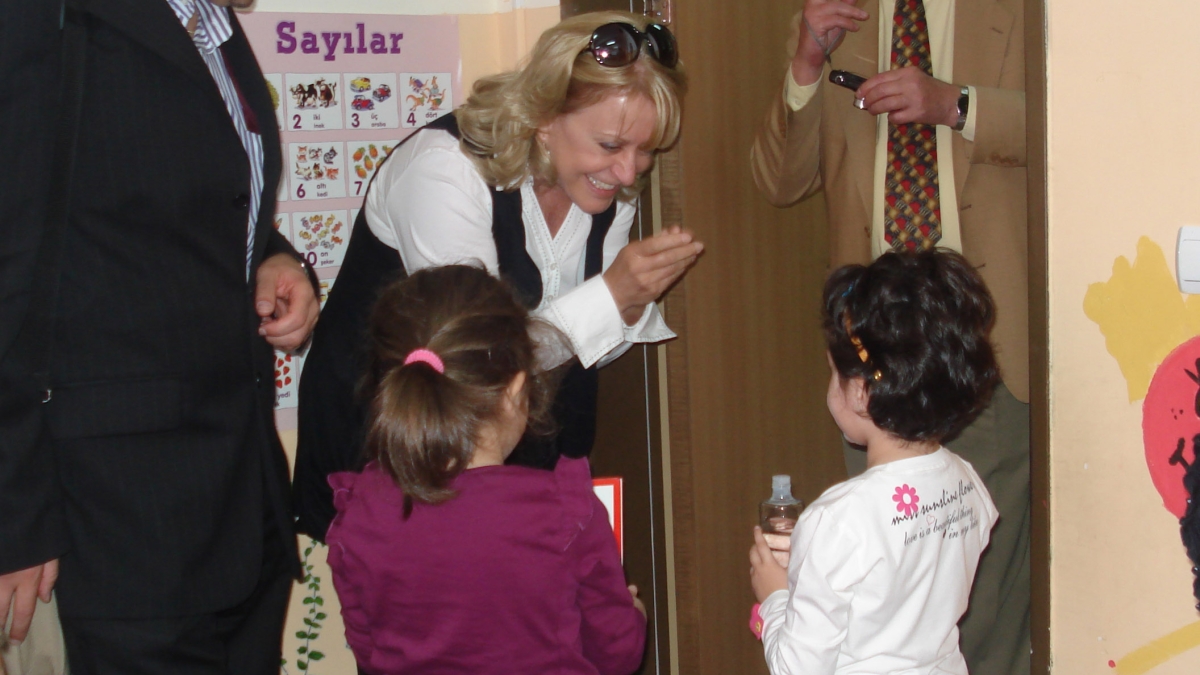Trip to Turkey launches early childhood education project

Three professors from ASU’s Mary Lou Fulton Teachers College paid a visit to Turkey in October to launch a long-term project to share expertise in early childhood education. The collaborative project with Turkish institutions including a university and preschool center aims to exchange information and materials related to early childhood teacher education programming, high-quality preschool curricula, intercultural comparisons and approaches to early childhood education, and more.
“At Teachers College we are accustomed to working in partnership with school districts, government agencies and nonprofit organizations in Arizona,” said Mari Koerner, the college’s dean. “This initiative represents an exciting opportunity to extend the scope of our partnership activities to a new level.”
The project is funded by a gift to ASU from Hal Tashman, executive chairman of the Turkish Philanthropy Funds, who is committed to helping enhance the quality of early childhood education programs in his home country.
“The initial trip by Teachers College faculty was exceedingly well-planned, and much work was covered toward the desired outcomes,” Tashman said. “I am very thankful to the ASU team and the support from Dean Koerner.”
The faculty members who made the trip, Mehmet “Dali” Öztürk, Cory Hansen and Michael Kelley, are experienced educators and researchers. Öztürk is assistant dean and assistant research professor in Teachers College, while Hansen and Kelley are associate professors in the college.
During their trip, the three spent time in Istanbul and Bolu, a city in the northwestern region of Turkey approximately 160 miles from Istanbul. Their primary purpose was to explore the opportunity to establish a partnership with Abant İzzet Baysal University (AIBU) and the Preschool Education Application and Research Centre (PEARC) in Bolu.
In addition to meeting with key individuals and hosting a seminar at AIBU and visiting PEARC, the ASU professors met with faculty at Bosphorus University in Istanbul. They learned of the importance of a neighborhood and community-based approach to early childhood education in Turkey. They also met with professor Cigdem Kagitcibasi, the lead researcher for a seminal 30-year longitudinal study on early intervention for mothers and at-risk children in Turkey.
“This line of empirical research provided support for developing university-level early childhood teacher education programming and evidence for the need for more preschool education opportunities for young Turkish children,” Öztürk said. “It was due to this research that a highly effective non-governmental organization, the Mother and Child Education Foundation, was founded in 1993 to provide parent education training for mothers and fathers of young children.”
In 2010, primary education became a provincial priority in Turkey. Since then, 27 provinces have been added to the list. The focus so far is on children who are five years old. The government wants the first phase of initial coverage to be for that kindergarten year. Programs for three- and four-year-olds are forthcoming.
This new emphasis on early childhood instruction has had a major impact on the education system, Hansen said. “Literally, there is not enough space for the required classrooms,” she said. “In some places classes are offered in rented apartments. The Ministry of Education is promoting the benefits of early childhood education, but it has been difficult to follow through with updated, relevant curricula, enough teachers, and the space to provide services.”
The Teachers College professors also learned of significant differences between Turkey’s education system and that in the United States. Teachers in primary and secondary schools are not hired by principals; instead they are placed in schools by the national Ministry of Education. And the ability to attend college is limited.
“Students in Turkey have to score high on a standardized test to be eligible to attend university,” Hansen said. “Students actually compete for seats in classrooms. Therefore, if a student does not score high enough, he or she has that door of opportunity closed.”
One of Tashman’s goals is for the project to help increase the number of new teachers in Turkey. “Not until recently has there been a focus on quality and training in teacher preparation,” Öztürk said.
Öztürk, Hansen and Kelley identified an evolving model of collaboration among the PEARC preschool, AIBU and the Ministry of Education in Bolu that could serve as a basis of a national model with ASU as a partner.
“The PEARC provides substantial opportunity for student practicum and student teaching experiences,” Kelley said. “AIBU faculty in early childhood education can design and conduct research on child learning and parent education. We hope that our partnership efforts can lead to some reform at the central ministry to allow AIBU and PEARC to grow a pipeline of their own preschool teachers who live in Bolu to teach in their schools.”
The next significant step in the project is expected to take place next spring, when AIBU leadership will visit Arizona to continue work on developing a model partnership based on educational innovation.
“This effort is a fine example of ASU's commitment to global engagement often expressed by President Michael Crow,” Tashman said. “It also is helping me realize a dream to positively impact early childhood education in Turkey.”